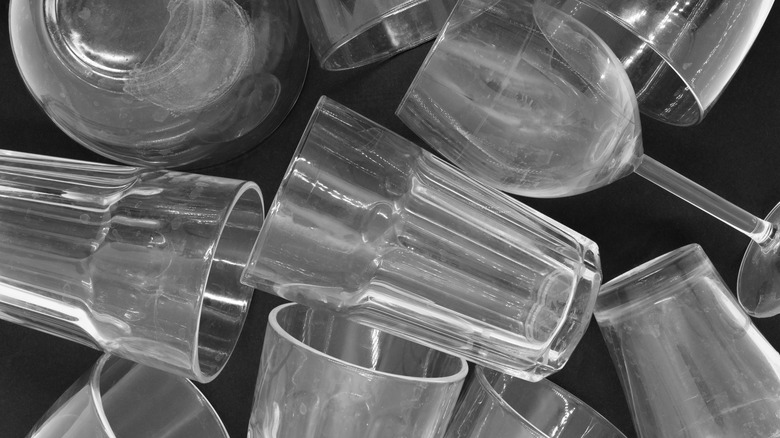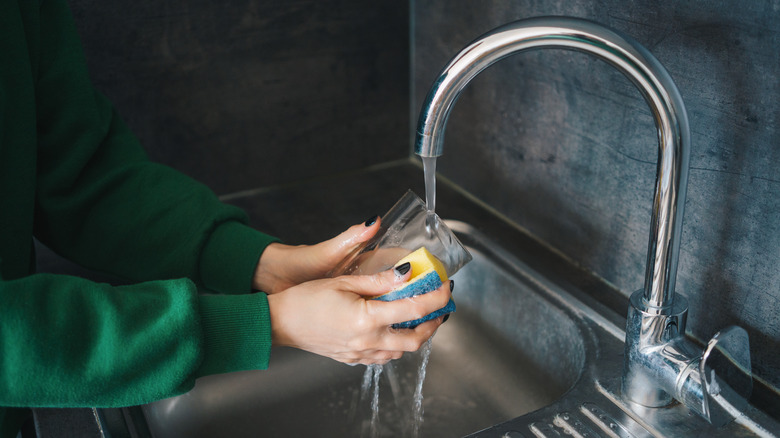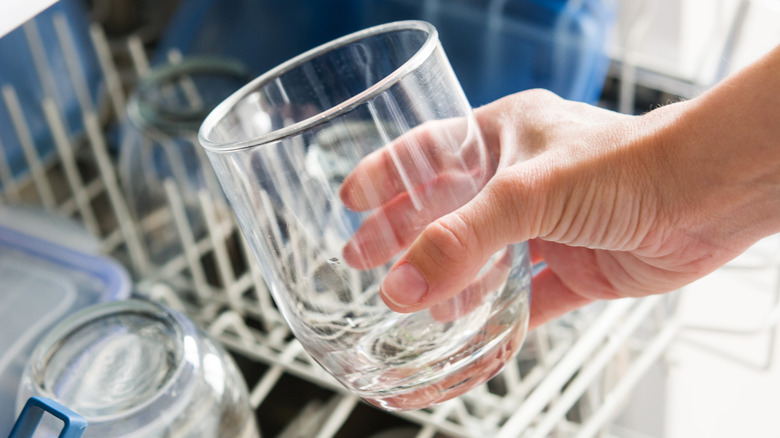The Reason Your Glassware Is Cloudy (And How To Fix It)
You could've sworn that you toweled each of your glasses until they were sparkling when they first came out of the dishwasher. But when you reached inside your cupboard for a wine glass, you found that there was a haze to it, as if someone had rubbed their grimy paws on your glassware and smudged them. You checked and all of your other glasses have this cloudiness to them, too. The good news is that you're not dealing with a practical (or slightly unhygienic) prankster. As for the bad news? The culprit lives inside your water pipes: Hard water.
Water is considered "hard" when it contains high levels of dissolved minerals like lime and calcium. If the level of hardness is high enough, you may even see white flakes swirling in the water stream when you open up the tap. While hard water is harmless and possibly even confers some health benefits when to those who drink it, these minerals can be a real nuisance when you need to use them to clean. Fresh out of the dishwasher, there may still be droplets of hard water sitting on the glass. In time, they can dry out and accumulate, causing that telltale fogginess. Fortunately, with some elbow grease, it's entirely possible to wipe the dried-out minerals from the glass.
Fixing cloudy glassware
The best way to keep your glassware stain-free is through handwashing and hand-drying. Most minerals in hard water, like calcium and magnesium carbonate, can be dissolved using an acid. No need for special cleaning agents — good old white vinegar will do the trick. Mix a one-to-one mixture of warm water with white vinegar in your sink. Then, dip your glassware into it and let it sit for a minimum of 15 minutes. Fish the glasses out and scrub them with a sponge. The cloudy film of minerals, now neutralized by the acid, will come off immediately. Give each glass an extra wash with hot water and dry carefully with a clean towel.
Hard water stains appear because the dried-out, mineral-rich water droplets get the chance to dry on your glass. So, if you were to wash and dry them immediately and thoroughly, even if the water you used to wash them was hard, you should still be able to avoid stains.
If afterward, if you find that the glasses still somehow look a bit cloudy, the odds are high that your glasses have been etched. The minerals will "wear out" the glass surface and cause permanent damage to its texture. Unfortunately, there's not much that you can do for your glass to restore it now. Should you want your glassware collection to look pristine, you'll have to replace the etched pieces.
Permanently fixing hard water
If you don't want to have to worry about hard water stains forever, there are a couple of solutions. The first is using specially formulated detergent tablets with your dishwasher. Made specifically to work with hard water, they can neutralize the minerals within the inflowing water and keep your glassware spot-free. Even if you don't have a dishwasher, there are detergents that can help you keep mineral deposits in check.
The more decisive solution is a water softening system. Albeit expensive, it can be a good investment for your household if hard water gives you a lot of grief. Excessively hard water can cause more than just glassware stains, they can cause clogged pipes, itchy skin (from soap scum), ruining your home-brewed coffee, and more. This system does exactly what it says on the tin: The machine comes with filters that remove minerals before they reach your taps, showerheads, and dishwasher. With one of these around, your home's pipes will be permanently hard water-free.


